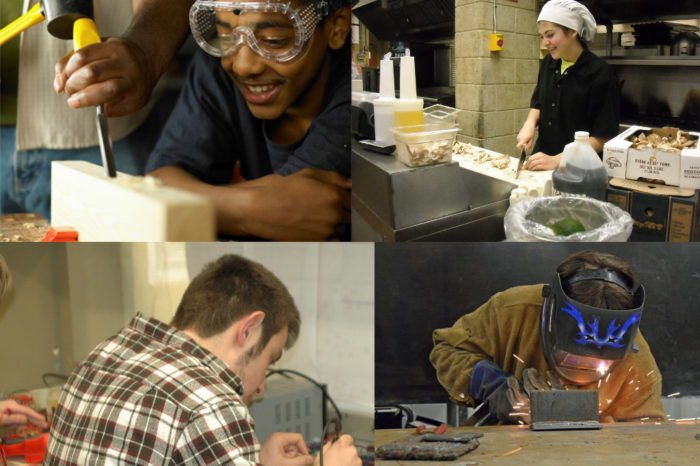Don’t mess with success of voc-tech high schools
This op-ed originally appeared in Commonwealth Magazine, and was also published in the Worcester Telegram & Gazette, Springfield Republican, The Lowell Sun, The Berkshire Eagle, the Fitchburg Sentinel & Enterprise, and more.
Authors: Tom Birmingham and Tim Murray
OUR ECONOMY IS changing faster than ever before, and no part of the Commonwealth’s system of public education has done a better job of keeping up with those changes than vocational-technical high schools. Expanding them would provide more opportunity for students and give employers the talent they need to keep growing.
It hasn’t always been this way. Not long ago, voc-tech schools were havens for underperforming students; now there are long waitlists to attend.
Massachusetts’s 1993 Education Reform Act included voc-techs when it required that students pass MCAS tests to graduate from high school. The schools succeeded at enhancing academics without compromising their occupational education mission.
Voc-tech students switch off on a weekly basis between academics and technical education. Despite spending only half their time on academics, they match their comprehensive high school counterparts on state test scores.
As technical jobs demand ever-higher skill levels, voc-techs are keeping up, thanks in part to the close relationships the schools have forged with area employers. Those relationships ensure that voc-techs continue to produce students with the skills and credentials businesses need, and also result in equipment and other donations from employers eager to keep the talent pipeline flowing.
Manufacturing is a good example. It remains an important part of the state economy, particularly in Central Massachusetts. But these aren’t your grandfather’s manufacturing jobs. They’re technology-dependent and require highly skilled workers. Employers rely on voc-tech school graduates to keep the sector thriving.
Students applying to regional voc-techs must meet entrance criteria. As the push to expand the schools gains momentum, some local officials and officials in state government believe we should move to a lottery system.
This is a dubious idea. Not all school choice programs are the same. Charter public schools were designed to provide parents with choices and foster innovation. The METCO program focuses on desegregation and providing inner-city students in Boston and Springfield with access to suburban schools.
Unlike charter public schools or METCO, voc-techs offer a significantly different curriculum than comprehensive high schools do. Such specialized education is not for everyone. Combine that with the fact that vocational-technical education is much more expensive due to all the equipment required, and it’s imperative that we take steps to ensure that there’s a match between the students who attend and the missions of these schools.
Notwithstanding entrance criteria, Massachusetts voc-tech schools serve a broad and diverse base of the Commonwealth’s high school population. Given that they enroll twice the state average of special needs students, it is hardly just academically elite students who apply to voc-techs. But their students show inordinate academic growth from ninth grade on.
Even though voc-techs serve more low-income and special needs students than comprehensive high schools, their dropout rate is just a third of that of their more traditional counterparts. Among special education students, the voc-tech graduation rate is 24 percentage points higher.
Today, two thirds of vocational-technical graduates go on to higher education. For those who choose not to, a Northeastern University survey of business owners and others found that voc-tech grads are more job-ready than other high school graduates.
For more than 25 years, Massachusetts vocational-technical high schools have done everything state officials have asked of them. Instead of moving the goal posts by compelling them to switch to a lottery system, we should expand the schools. Doing so would provide opportunity to all the students who can benefit from their unique blend of rigorous academics and hands-on occupational education and give employers the talent they need to fuel continued economic growth.
Tom Birmingham is a former Massachusetts Senate president and a distinguished senior fellow in education at Pioneer Institute. Former Massachusetts lieutenant governor Timothy Murray is the president and CEO of the Worcester Regional Chamber of Commerce.
Receive Our Updates!



